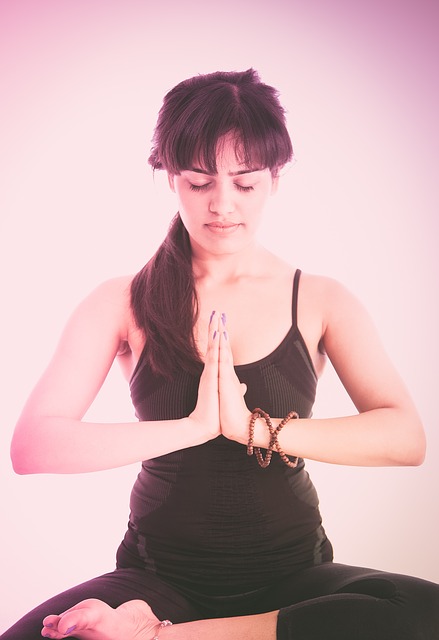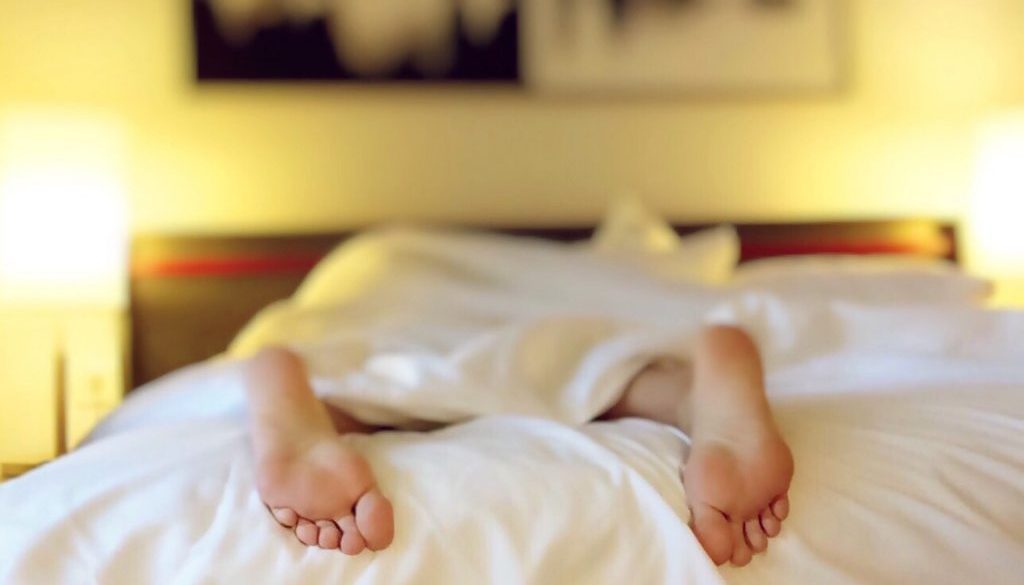Anxiety at Night – 19 Ways to Work with Evening Anxiety
Anxiety at Night – 19 Ways to Work with Evening Anxiety
Anxiety disorders are incredible common, and anxiety at night is a common symptom experienced. The Anxiety and Depression Association of America reports that over 18% of adults in the United States experience an anxiety disorder in a given year, and only 36% of those suffering from anxiety receive help. Like depression, anxiety is a common mental health disorder that many people experience.
Anxiety during the day can be debilitating and prevent you from facing life fully. Experiencing anxiety at bedtime can be just as bad, preventing you from falling asleep, staying asleep, and getting the physical and mental rest that you need. Maybe you’re going over your day in your head or thinking about work. This can worsen depression, hurt overall mental health, and make you feel exhausted. The good news is that there are things you can do to relieve nighttime anxiety and encourage healthy sleep.
Symptoms of Anxiety at Night
Anxiety can come in many forms, and people may experience anxiety differently than each other. You may not feel it exactly as another person. For example, anxiety in teens may be more likely to arise as social anxiety, while anxiety in older adults may arise as work-related stress or panic attacks. Anxiety at night is similar; people may have a different set of symptoss than one another.
In general, nighttime anxiety symptoms include:
- Nervousness or restlessness
- Rapid heart rate
- Feeling of danger or dread
- Rapid breathing
- Gastrointestinal problems such as gas, bloating, or diarrhea
- Palpitations and sweating
- Chest pain or tightness
- Difficulty falling asleep
- Difficulty staying asleep
The symptoms may be subtle or severe, depending on the case. You may notice a mind that is obsessing about something and a body that feels restless. In a more severe case of anxiety at night, you may find yourself sweating, shaking, or feeling a tightness in the chest, even leading to a panic attack.
Knowing the symptoms of anxiety is important because it can help you identify what you are experiencing and feel it with clarity. Rather than sitting up at night wondering why you cannot sleep, you have the opportunity to acknowledge the presence of anxiety and take action to work with it.
Causes of Evening Anxiety
The potential causes of anxiety are numerous. Anxiety in college students may be fueled by holding onto negative emotions and difficult financial situations, while anxiety in parents may be caused by employment worries or family issues. For each individual, the circumstances that cause nighttime anxiety may be unique.
 We do know of many potential causes of anxiety, and I will cover ways to relieve anxiety next. First, let’s look at some of the common causes:
We do know of many potential causes of anxiety, and I will cover ways to relieve anxiety next. First, let’s look at some of the common causes:
- Stress at work, school, or in family life
- Financial stress
- Trauma, loss, and/or grief
- Use of mind-altering substances
- Use of stimulants like caffeine, nicotine, and cocaine
- Overactive thyroid
- Mental health disorder such as generalized anxiety disorder, phobic disorder, depression, or other mood disorder
For those that struggle with anxiety, there may not be anything you’re doing “wrong.” Generalized anxiety is a recognized disorder, and it may be largely biological. However, there are certain habits and actions that can increase anxiety in the evening and diminish sleep quality. These include:
- Using screens (phones, tablets, televisions, etc.)
- Lack of consistent routine (timing, place of sleep, etc.)
- Poor eating habits (overeating or undereating during your day)
- Too much light (sleeping during the day or with lights on)
- Consuming stimulants in the afternoon or evening
You can start dealing with your evening anxiety by looking at your bedtime routine to see if there are things you can do to help yourself sleep better.
Ways to Relieve Nighttime Anxiety
So, how do you actually relieve the anxiety at night? I have a handful of tips and pieces of advice here to help you get your sleep and relieve the anxiety at night, and encourage you to investigate for yourself what helps and what doesn’t. Everyone has their own unique experience, so remain open to different practices and methods. Feel into your experience and investigate. Remember, if you are having trouble with any of these you can always work with a therapist online or in person to help you reduce night time anxiety.
I’ve separated this list out into things you can do at night while you’re experiencing anxiety, and overall changes you can make during your day that may help reduce anxiety once you get into bed.
When Anxiety is Present
Turn the Clock Around
This may seem like a painfully simple tip, but it goes a long way. When experiencing anxiety, you may have the tendency to look at the time over and over again. Although this may seem relatively innocent, it can cause more stress and anxiety as you worry about not getting to sleep. To help, simply put your phone in the other room and turn the clock around. Remove the temptation.
 Practice Deep Breathing
Practice Deep Breathing
The breath is intimately connected with our minds and bodies. By breathing deeply, you can physically calm the body and slow the thinking mind. Specifically, the breath affects the nervous system. By lengthening your exhale, you are engaging the parasympathetic nervous system and letting your mind and body know you are safe. Try taking a few deep breaths, making the exhalation slightly longer than the inhalation.
Do a Progressive Muscle Relaxation
When you’re experiencing anxiety at night, you may notice that the body can grow tense. A progressive muscle relaxation is a practice in which you move through the body making an effort to relax each part. Anxiety BC offers a great guide for free here that I recommend. When asked for advice on dealing with any type of anxious feelings, I frequently suggest this practice to help.
Write Down Your Thoughts
There has been quite a bit of research to suggest writing in a diary or journal can significantly reduce anxiety. If the mind just won’t stop going, take a moment to write down what’s going on. This can help clarify your thoughts, give you a release, and move on.
Change the Noise
If you listen to music or a show while trying to fall asleep, try shutting it off. If you’re trying to sleep in silence, try putting on some relaxing music or some sort of white noise. We often forget about the sense of hearing, but stimulation of the ears can make a big difference. Too much noise keeps the brain going, while silence can leave too much space for the mind to race.
 Utilize Aromatherapy
Utilize Aromatherapy
I don’t often recommend aromatherapy as the science supporting it’s efficacy is sometimes shaky. However, there is quite a bit of research on lavender essential oil. One study found that it induces sleep and increases deep sleep. So get some lavender oil or investigate other essential oils for sleep.
Visualize
Visualization practices can be extremely beneficial in inducing sleep and reducing nighttime anxiety. You can picture yourself on a beautiful beach in Mexico, sitting quietly in your happy place, or floating in the clouds. Really try to tune into how it feels as you visualize, taking your mind and body out of the anxiety and into a state of relaxation.
Change the Script
This is a method of dealing with anxiety at night that a mentor offered to me personally when I was a young adult. When you’re stuck up at night unable to sleep, the mind can begin harshly judging and beating yourself up. Instead, change the script in your head. See if you can utilize the time and read a book, take a walk, or do something different. Instead of resting in anxiety that you cannot sleep, see if you can treat the time as an opportunity to do something useful!
Get Up
Finally, if you are just having trouble sleeping and are overcome with anxiety, get up. By staying in bed too long, you may actually be perpetuating the cycle of anxiety. You notice you’re not sleeping, and this makes you more anxious. Instead of just resting in the stress, you can try getting up and taking a bath, going for a short walk, or reading a book. Come back to bed after some time has passed, and try to sleep again. If you are overcome with anxiety in bed, repeat the cycle.
Habits and Life Changes
Learning to deal with anxiety at night when it arises is useful, but you can also work toward having less bedtime anxiety overall. Research has shown that there are many things you can do to encourage healthy sleep and decrease anxiety during your day. Here are a few things that I have found useful in my work.
Avoid Screens Before Bed
This is one thing you probably already know is bad for you before sleep. Multiple studies have found that screen usage can hurt sleep quality. The blue light of a screen can prevent you from falling asleep and leave you feeling more groggy in the morning. Steer clear of screens for at least an hour before bed. Try reading a book instead, or even listening to music.
 Eat Healthy
Eat Healthy
What you eat during the day can have a dramatic impact on anxiety levels, especially in the evening. There are nutrients that can reduce anxiety, such as zinc, magnesium, omega-3 fatty acids, and probiotics. Foods high in sugar and trans fats may worsen symptoms of anxiety. Tune into what you eat, and try to turn toward less-processed, more natural foods to help quell feelings of anxiety in the evening.
Leave the Stimulants
The link between stimulants and sleep is well-documented, and using stimulants at any point during your day can impact anxiety and restlessness when you get in bed. Begin leaving the stimulants behind, slowing your coffee intake, quitting smoking, and steering clear of any illicit stimulants. It may be hard to do, but can work wonders in dealing with anxiety in the evening. Furthermore, stimulant use can cause you to wake up feeling less rested, and prevent your body from getting the deep states of sleep it needs.
Get Up and Move
Getting some exercise during the day has obvious benefits for your physical health, but exercise can relieve symptoms of anxiety as well. Exercise during your day impacts your mind and body in numerous ways, and can help you reduce anxious feelings and get better sleep. It doesn’t have to be a hardcore workout. You can add a walk to your day, ride your bike, or do some yoga. Maybe you can find an activity you like and can do without it feeling like a chore. For me, that’s surfing. Try to incorporate some periods of movement and exercise into your day regularly to reduce the anxiety at night.
Meditate
There are many benefits of meditation, including the potential to reduce anxiety and aid in healthy sleep. According to Harvard Health, meditation can help you fall asleep and stay asleep regardless of when during the day you meditate. Meditating in the morning can help you sleep at night just as much as a period of meditation in the evening. Try incorporating a few minutes of mindfulness meditation into your day! You can check out the meditation guide for beginners if you’re interested in getting started with meditation at www.OneMindDharma.com/meditation-guide-for-beginners.
Relax Before Bedtime
Your habits during the day and before going to bed at night can dramatically impact the anxiety and restlessness you experience. You can take the big steps like avoiding screens, but you can also change your bedtime routine. Take a bath before getting into bed, read a book, or shut the lights off. These relaxing activities can help remind your mind and body that it’s time for sleep, and give you a bit of a buffer between daily life and trying to sleep.
Don’t Spend Time in Bed
The bed is not a place for hanging out. Avoid being in bed all day if you can. The bed should be reserved for specific activities like sleep and sex life. When you watch television in bed or do homework in bed, you are training the mind and body to be on while lying down. Instead, make the bed a place where the mind knows it’s time to relax. After a while, the mind will naturally associate the bed with relaxation and sleep rather than anxiety and restlessness.
Create a Sleep Schedule
A
With regular daily activities, our various body systems are able to prepare for and anticipate events. We naturally become more alert closer to our wake-up time. Our digestive systems become activated in advance of regular meal times in order to more efficiently process food. We start to relax and become sleepy prior to bedtimes.
Get Some Sunshine
The body has what is called the circadian rhythm, which is a system impacted by the pineal gland to trigger melatonin production and control sleep patterns. Blue light from the sun (or screens) causes the body to release melatonin, telling us that it is daytime and to stay awake. When the light is absent, the body knows it is time to sleep. By getting outside and getting a lot of sun, you are creating a big contrast in melatonin when the sun goes down and the lights go off. Getting more sunshine during the day can actually help you sleep better at night, as the body recognizes that it’s time to relax.
Seek Out Therapy
Finally, remember that Generalized Anxiety Disorder is a recognized issue that many people deal with. You’re not alone. You can find a therapist to work with to help ease the anxiety that arises at night. Individual therapy has been found to be effective at treating anxiety disorders, and you can work toward getting the sleep you need to live a healthy and whole life.
Receive updates from my blog!



